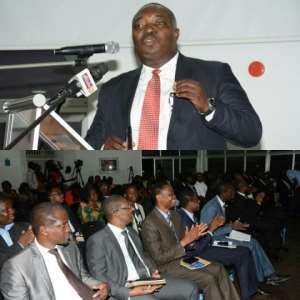
Accra, July 27, GNA - Professor Robert Darko Osei, the Vice Dean for the School of Graduate Studies, University of Ghana, has urged the Government to check efficiency of public spending.
'We need to check the efficiency of government spending, to help strengthen the public financial management system in the country,' Professor Darko Osei stated at the second public lecture for the Pentvars Business Journal (PBJ), the official journal of the Pentecost University College (PUC).
He said the 2017 Budget Statement had the potential to address the development challenges, however, whether or not it achieved the broad level goals would depend on a number of factors including 'leakages' in spending and whether incentives would engender private sector investment.
The public lecture was on the theme: 'Ghana's Development Agenda - Is the 2017 Budget a Formula for Success?'
The academic referred journal aims at contributing to the ongoing dialogue that would hopefully lead to fruitful and effective action to ensure the successful execution of Ghana's developmental agenda.
Professor Osei said both investments and savings had picked up since the mid-1980's, whereas public investments remained quite important and it had in large part been financed from foreign aid.
He noted that gross savings in the country remained low, at below 20 per cent, and that this explained the 'borrowing'.
'The extent to which this has contributed to long term debt depends on the returns to the general use of the borrowing,' he said.
He said the macroeconomic targets set in the budget were pointing the right way, as it was bold to relook the statutory funds and use that to create a bit more fiscal space.
The Vice Dean noted that the budget talks about shifting 'focus of economic management from taxation to production,' but this, in a short term, could result in a decline in tax revenue.
He said it was important to note that the elasticity of revenue change in the effective tax rate depended on how long it took growth to respond, and shift incentives from 'cheating' to 'compliance'.
Dr Esther Ofei-Aboagye, the Deputy Chairperson of the National Development Planning Commission, said the provisions in the budget had some prospects for promoting the development agenda; however, some of the incentives like the abolishing of Value Added Tax (VAT) on domestic flight were not initiatives that the poor would benefit from.
She said there were good initiatives, for instance the creation of regional development authorities as the bill was now going through Parliament, four months after the budget had been read; and this implied that there would not be enough time for implementation.
Dr Ofei-Aboagye said the issue of institutions, structures and systems to mop up the gaps was also a matter of concern.
'We need to be involved as citizens in the entire budget process, not only in the formulation but the implementation and review,' she added.
Apostle Daniel Walker, the PUC Rector, said often times some governments were not faithful to their own budget, stating that; 'This is where as a nation we should have the will power to implement the provisions in the budget'.
He said the expectations of the people after the budget had been read had nothing to do with financial jargons and, as such, all and sundry were hopeful that the 'Asempa Budget' would actually bring development.
Apostle Walker commended the PBJ Editorial Board, under the chairmanship of Professor J.B.K Aheto, for having the vision of ensuring that PUC becomes a centre of academic and professional excellence.
GNA
By Iddi Yire, GNA




 Lay KPMG audit report on SML-GRA contract before Parliament – Isaac Adongo tells...
Lay KPMG audit report on SML-GRA contract before Parliament – Isaac Adongo tells...
 Supervisor remanded for stabbing businessman with broken bottle and screwdriver
Supervisor remanded for stabbing businessman with broken bottle and screwdriver
 NDC watching EC and NPP closely on Returning Officer recruitment — Omane Boamah
NDC watching EC and NPP closely on Returning Officer recruitment — Omane Boamah
 Your decision to contest for president again is pathetic – Annoh-Dompreh blasts ...
Your decision to contest for president again is pathetic – Annoh-Dompreh blasts ...
 Election 2024: Security agencies ready to keep peace and secure the country — IG...
Election 2024: Security agencies ready to keep peace and secure the country — IG...
 People no longer place value in public basic schools; new uniforms, painting wil...
People no longer place value in public basic schools; new uniforms, painting wil...
 'Comedian' Paul Adom Otchere needs help – Sulemana Braimah
'Comedian' Paul Adom Otchere needs help – Sulemana Braimah
 Ejisu by-election: Only 33% of voters can be swayed by inducement — Global InfoA...
Ejisu by-election: Only 33% of voters can be swayed by inducement — Global InfoA...
 Minority will expose the beneficial owners of SML, recover funds paid to company...
Minority will expose the beneficial owners of SML, recover funds paid to company...
 Prof. Opoku-Agyemang has ‘decapitated’ the NPP’s strategies; don’t take them ser...
Prof. Opoku-Agyemang has ‘decapitated’ the NPP’s strategies; don’t take them ser...
